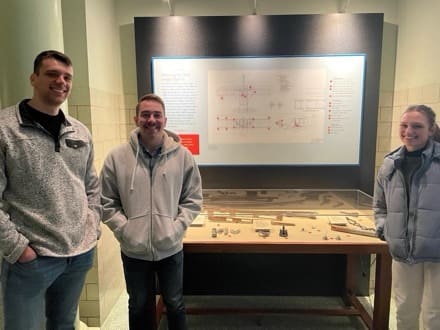
WRIGHT-PATTERSON AIR FORCE BASE, Ohio – The Intelligence, Surveillance, Reconnaissance and Special Operations Forces (ISR & SOF) Directorate, recently put together a digital acquisition team comprised of junior workforce members, to develop a digital light reconnaissance aircraft.
Known as the Digital PAQuisitions team, the team’s goal is to create a digital version of an aircraft and make it available for when a U.S. foreign military partner expresses interest in a light reconnaissance capability. Once the foreign military partner is approved for the capability, the digital model can be taken “off the shelf” and turned into a physical aircraft, ultimately saving years in development, production, and fielding time.
“Digital acquisitions is a large shift from how we’ve traditionally performed acquisitions, where we built physical prototypes and tested those,” said Lt. Col. Christopher Rasor, Materiel Leader for the Directorate’s Light Reconnaissance Foreign Military Sales (FMS) Branch, and lead for the digital acquisition team. “We are looking to build digital prototypes and put those through the paces before we build a production ready asset. As an example, it will take less than 18 months to create a digital prototype of a light reconnaissance aircraft, build the asset and field it to the customer. Currently, using traditional acquisition methods it is taking an average of five years to field assets.”
The Light Reconnaissance FMS Branch is responsible for modifying commercial aviation aircraft for military ISR missions. For example, a Beechcraft King Air 350 could be upgraded with a tactical radio, video and infrared camera, and a sensor operator workstation, then fielded to foreign allies for use. With digital technology, the branch will not only be able to create a new aircraft, but will also be able to better sustain current aircraft.
Currently, the digital acquisition team is working on digital acquisition documentation and planning, as well as conducting market research to understand industry’s ability to integrate with the U.S. Air Force in a digital environment. Next, the team plans to release a request for proposal on its first digital acquisition, employing model-based systems engineering and digital product lifecycle management to create a light reconnaissance aircraft for a foreign military partner in Central America.
“It has been great being part of this team,” said 2nd Lt. Delaney Pollak, CENTCOM and AFRICOM Section Commander with the Branch. “As junior workforce, our goal is to bring a fresh perspective to this digital acquisition project, and create a template that other offices can use.”
“We are focused on delivering a light reconnaissance platform to a partner or ally in a timeframe where that capability is relevant to their mission,” said Rasor. “Digital acquisitions is one way that is going to help us deliver that capability, and not just for foreign military sales, but for the U.S. Air Force as well.”
By Brian Brackens, Air Force Life Cycle Management Center Public Affairs

